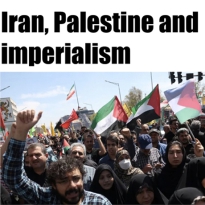Shared
You are here
Greek elections: Parliament and the struggle

September 2, 2015
Greece’s election looks set to produce a confrontation between a new coalition government trying to implement austerity and workers’ resistance against it. So it’s important for the left to emerge stronger—and the prospects for this are real.
The first opinion polls after the summer break show former prime minister Alexis Tsipras off to a very weak start in the election campaign. He is struggling to rally the people who voted for his left wing party Syriza back in January, because his U-turn on austerity has put him in direct conflict with them.
Amid mass resignations and a major split, Tsipras has two main tactics for Syriza’s election campaign.
He is promising that Syriza can “do austerity better”. That means implement the package of attacks dictated by the European Union (EU), the International Monetary Fund, the bankers and the rich but soften the toughest measures. But there’s no basis for this. The economy is not improving and he already failed to win these achievements this year.
Then he’s trying to polarise the vote between Syriza and the Tory party, New Democracy. He argues that people must vote Syriza to make sure that the failed political system that imposed so many sacrifices on them can’t come back. This is squeezing smaller parties, such as Syriza’s former coalition partner the right wing nationalist Independent Greeks, as well as the so-called centre left. But the reality is that Syriza and New Democracy voted together for the austerity deal and now face the prospect of forming a coalition government together.
At the same time a third force is joining the left opposition. Previously it was mainly the Communist Party inside parliament and the anti-capitalist left coalition Antarsya outside it. Now a split from Syriza to the left, Popular Unity (PU), is opposing the bailout deal and calling for a break with the euro. This is a step forward, and it means we can expect more voices supporting workers’ resistance.
Alternative
But then comes the question of how you support that resistance. Tsipras has attacked the left by saying we have no alternative. We must answer that by outlining one. That’s why it’s important to raise anti-capitalist demands.
For example, Tsipras claims that PU’s proposals to leave the euro will mean austerity with the drachma and that this will be even worse. He says it will lead to devaluation and inflation—hitting wages, pensions and savings. PU’s main economic spokesperson, Costas Lapavitsas, responds that the drachma will stabilise and the government can help wages recover. Its leader, former energy minister Panagiotis Lafazanis, says “re-adopting the drachma is not a catastrophe.”
This doesn’t really respond to the scaremongering. The point is that the crisis Tsipras predicts isn’t automatic. The drachma won’t devalue itself—the bosses will devalue it through capital flight. The same bosses will drive up prices through speculation. So fighting austerity has to mean fighting the bosses.
Antarsya proposed a common campaign with PU if they agreed to anti-capitalist measures, such as breaking with the EU and imposing workers’ control. The gist was about making sure workers defend themselves through their own organisations and activity rather than relying on parliament. This was rejected, so we will have to campaign separately. But we are hopeful that after the election we can unite in fighting back.
A trade union demonstration in Thessalonica this Saturday will be an opportunity for all the left—Antarsya, PU and the Communist Party. We can push for a big turnout to show we are mobilising against the austerity deal. And there will be protests outside the trial of the fascist Golden Dawn party when it restarts next week. Anti-fascists are also organising to make sure people don’t forget that two years ago this month Golden Dawn supporters murdered anti-racist Pavlos Fyssas.
July’s referendum showed workers’ anger at the austerity deal. Their determination to fight back hasn’t gone away.
Panos Garganas is editor of Workers’ Solidarity, Socialist Worker’s sister newspaper in Greece. This is shared from Socialist Worker (UK)
Section:










